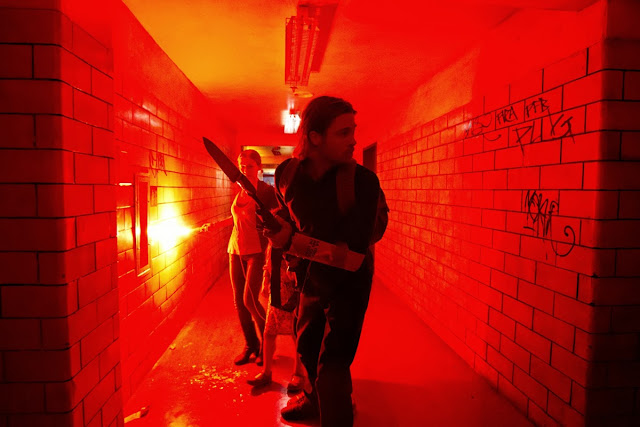Director: Spike Jonze
Starring: Joaquin Phoenix, Amy Adams, Rooney Mara, Olivia Wilde, Scarlett Johansson, Chris Pratt, Matt Letscher, Portia Doubleday, Brian Cox
Running Time: 125 min.
Rating: R
★★★ (out of ★★★★)
I'll have to tread lightly in properly explaining my minor disappointment in Spike Jonze's Her. The very word "disappointment" is a film critic's worst enemy because it implies expectations. That in itself isn't fair, but it's true. When you have a director that's as original and groundbreaking as Jonze you can't help but anticipate a grand slam each time out. It's very good, but leaves this nagging feeling it wasn't all it could have been, despite it being difficult to describe exactly how. To be honest, it's kind of surprising it's struck the chord it has amongst critics and moviegoers, even earning enough admiration to sneak in as a Best Picture nominee. Something this eccentric usually ends up splitting everyone down the middle. But it's easiest to name what it does exceptionally well, and topping the list is the depiction of a near-future that's completely believable in terms of technology and its effect on our lives.
Theodore Twombly (Joaquin Phoenix), is a shy introvert who works for a company that writes personal love letters, but he's lately been distracted and depressed over his upcoming divorce with childhood sweetheart, Catherine (Rooney Mara). His new rebound girlfriend is an Operating system, or OS, named "Samantha" (voiced by a never seen Scarlett Johansson), who's designed to behave and evolve as an actual human being would. Unready for the commitment that comes with an actual human relationship so soon after the collapse of his marriage, he unrealistically holds out up for a reconciliation with Catherine, even if Samantha seems to be the perfect substitute. For him, it represents the chance to open up about his fears and dreams without having to deal with the complications that might accompany a conventional relationship (or so he initially thinks). For Sam, it's a chance to learn and grow, transcending her role as an OS to more closely resemble an actual person with real, rather than programmed, feelings. Of course, both want something out of this neither can possibly get from the other and with that comes the realization that even an artificially programmed relationship can come with pitfalls. And for the emotional fragile Theodore, just as much pain.
That this still feels like a one man show with so loaded a cast is a credit to what Phoenix does with a role that on paper seems thankless. He steers this premise as far as he can and then some because, if we're being completely honest, this is still about a man who falls in love with his computer. And yet not. It's up to the actors and script to somehow make that concept work, so from that perspective it's hard to call the effort anything other than a success. As for Johansson, it's ironic she isn't physically present to witness what ends up being her most captivating performance in a while. When compiling a list of her greatest attributes, her unmistakably deep and raspy voice probably goes unnoticed by comparison, making it a stroke of casting genius from Jonze to recognize that and nab her. It's also maybe a stroke of luck considering the part was originally intended for Samantha Morton, who was dropped at the last minute. More than that, there's this rare opportunity for Johansson's looks to be taken completely out of the equation. The conversations and flirtation between the two are initially compelling, and when the time comes for their relationship to get "physical," what occurs is downright bizarre.
We know where all this is headed and it's hardly a spoiler to say that Theodore is going to get dumped to learn lessons about life and himself. And that's when it started overstaying its welcome a bit with me in the third act. There are only so many arguments, misunderstandings, make-ups and examples of petty jealousy you can take, especially when one half of the couple is a disembodied voice. And because the relationship is is so believable it almost veers away from speculative sci-fi and social commentary, evolving instead (along with Samantha) into conventional relationship drama territory. When that happened, I started losing interest and at just over two deliberately paced hours, it's arguable Jonze should have spent more time in the editing room. The closing half hour in particular seems to almost spin motionlessly, in search of an ending. Eventually it finds one, even if I'm still not sure it's the one it deserved.
It's worth noting how everyone around Theodore reacts to his new girlfriend since it teeters on the edge of being completely absurd, while somehow remaining relatively realistic. For ex-wife Catherine, it's the former, and yet another excuse for him to avoid a real adult relationship with responsibility and actual consequences. We're shown poignant glimpses of their marriage and it's relatively easy to judge what went wrong based on flashbacks and a pained conversation between the two late in the film. His friend Aimee (Amy Adams, basically covering Cameron Diaz's role in Being John Malkovich, complete with the frizzy hair), is supportive, as is his happy-go-lucky co-worker Paul (Chris Pratt). Seeing everyone's differing reactions to Samantha within the context of this society was strangely more interesting to me than anything involving Theodore's relationship with her. But the most discussion-worthy scene involves his blind date with a clingy friend of Aimee's (memorably played by Olivia Wilde), that doesn't at all go in the direction you're expecting, and the result is all the more intriguing because of it.
Her is melancholy in both tone and atmosphere, to the point that at times I found it almost unbearably depressing and claustrophobic, with very few moments of uplift. Even the supposedly happy moments have this tinge of sadness to them. Did it hit too close to home? Am I just sick of watching people on their phones? Or maybe it's impossible to feel any true excitement watching a man fall in love with his operating system. You bring a bit of yourself to every movie you see but that rings especially true here, as anyone who see it is likely to only do so through the filter of their own experiences and relationships. But it sure is something to look at. The world building by Jonze, the costume and production team, and cinematographer Hoyte van Hoytema is incredible, making it impossible to go through a scene without appreciating all the attention to visual detail. As expected, Arcade Fire's score is top notch. Going just far enough, it resembles a future we'd recognize, but features enough elements that it could easily be mistaken for the present or any other point in time. The aesthetic decisions not only make sense, but don't date the movie, insuring it could be one of the rare future cinematic societies we don't giggle at a few years down the line.
The situation that unfolds here could literally happen next week, if not right now. Everyone's already figuratively in love with their phones and electronic devices so the idea of a lonely man literally falling in love with one isn't much of a stretch at all. Jonze should be praised for not making that obvious point and turning the premise into a finger wagging condemnation of our obsession with modern technology, which would have been too easy, not to mention pointless. Instead, you could argue the exact opposite argument is made, in that technology can open our hearts and minds, just as long as it isn't used a surrogate for curing the personal problems we heap on ourselves.



















































































































